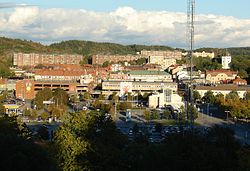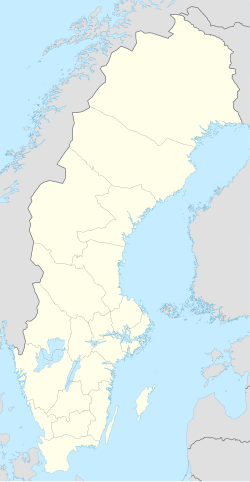Uddevalla is a town and the seat of Uddevalla Municipality in Västra Götaland County, Sweden. In 2015, it had a population of 34,781.[1]
Uddevalla | |
|---|---|
 Overlooking the centre of Uddevalla | |
| Coordinates: 58°20′57″N 11°56′17″E / 58.34917°N 11.93806°E | |
| Country | Sweden |
| Province | Bohuslän |
| County | Västra Götaland County |
| Municipality | Uddevalla Municipality |
| Area | |
• Total | 16.92 km2 (6.53 sq mi) |
| Population (31 December 2015)[1] | |
• Total | 34 781 |
| • Density | 1,845/km2 (4,780/sq mi) |
| Time zone | UTC+1 (CET) |
| • Summer (DST) | UTC+2 (CEST) |
It is located at a bay of the south-eastern part of Skagerrak. The beaches of Uddevalla are filled with seashells and Uddevalla has one of the largest shell-banks in the world.[citation needed]
Uddevalla has a port and it once had a large shipyard, the Uddevallavarvet ("Uddevalla wharf"), which was the largest employer in Bohuslän during the 1960s. The 1970s recession, that affected the Swedish shipyard industry severely, led to the closing of the wharf in 1985.
History
editUddevalla received its town privileges in 1498, but thought to have been a place of trade long before that.[by whom?] Formerly, Uddevalla belonged to Norway, and its name today comes from the original Norwegian Oddevald, which later turned into Oddevold. Due to its close location to Sweden and Denmark, it was often besieged.[citation needed] In 1612, it was burnt down by Swedish troops led by Jesper Mattson Krus and in 1644, it was once again burnt down, this time by Swedish commander Harald Stake.[citation needed] In 1658, it was ceded to Sweden at the treaty of Roskilde. The Norwegians recaptured the town a year later, and in 1660, it was once again ceded to Sweden at the peace treaty of Copenhagen. Later, Norway annexed Uddevalla and the nearby fortress on the Galleberg repeatedly, the last time in 1788.[citation needed]
In the 18th and 19th century, Uddevalla's main source of income was herring fishing. The town was also noted for the great fires that damaged the city on several occasions.[citation needed] The most devastating fire was in 1806, when the whole town burned to the ground. Only four houses were left untouched and 4,000 people became homeless.[citation needed]
During the 19th century, Uddevalla had trouble getting out of its own recession; poverty and alcoholism were widespread among the population.[citation needed] The reasons were mainly the aftermath of the fire in 1806, the decrease in herring fishing and the opening of the Trollhätte Canal.[citation needed]
In 1870–80, Uddevalla began to attract new industries. Much of that development can be attributed to the Scottish businessman William Thorburn, who is said to have been amazed by the town's beauty and therefore settled down in Uddevalla with his wife Jessy Macfie in 1822.[2] He founded a number of industries, starting mostly with textile companies. The building of a new railroad, the Bohus Line, also contributed to the town's recovering economy. A prominent person in Uddevalla's history was Ture Malmgren, newspaper publisher and progressive liberal politician.
During the 1958 FIFA World Cup, Uddevalla was one of twelve Swedish towns to host matches, which were played at the Rimnersvallen stadium.[3]
21st century
editAfter the Swedish shipyard crisis during the 1980s, resulting in the closing of the Uddevallavarvet, Uddevalla suffered an economic setback.[citation needed] Over the thirty years following that, the town has recovered and the population is once again increasing, slowly but steadily.[citation needed]
Education
editAll the high schools in Uddevalla are administered as one school, the Uddevalla Gymnasieskola ("Uddevalla High School"), which is now the largest high school in Sweden.[citation needed] The school has 4,000 students attending the following branches of the high school:
- Agneberg – Social studies
- Sinclair (High school) – The arts and Media studies
- Östrabo 1 – Science studies
- Östrabo Y – Heavy industry schooling
- Margretegärde – Social studies and Science studies
There are also many primary schools in Uddevalla, some of them are:
- Äsperödskolan
- Västerskolan
- Fridaskolan
- Ramnerödsskolan
- Norgårdenskolan
- Norrskolan
- Sommarhemsskolan
Sports
editArenas
editAgnebergshallen is an indoor sports arena for various sports including handball.
The home ground for the IK Oddevold is the outdoor arena Rimnersvallen. A large indoor arena, the Rimnershallen, is next to the Rimnersvallen. It is used for handball and floorball as well as other sports.
Sports clubs
editThe following sports clubs are located in Uddevalla:
Football
edit- IK Oddevold
- IFK Uddevalla
- IFK Lane
- Herrestad AIF
- IK Rössö
- IK Svane
- Rosseröds IK
Hockey
editHandball
editFloorball
editFutsal
edit- IFK Uddevalla Futsal Swedish Championship gold season 2016/2017.
- IK Oddevold Futsal
Twin towns – sister cities
edit- Jõhvi, Estonia
- Loimaa, Finland
- Mosfellsbær, Iceland
- North Ayrshire, Scotland, United Kingdom
- Okazaki, Japan
- Skien, Norway
- Thisted, Denmark
Notable people
edit- Oscar Akermo - tattoo artist
- Jenny Alm - handballer
- Marianne Aminoff - actress
- Eva Andersson - swimmer
- Håkan Andersson - motocross racer
- Wilma Andersson - murder victim
- Eva Andersson-Dubin - physician and model
- Mikael Appelgren - handballer
- Johan Arneng - footballer
- Percy Barnevik - business executive
- Signe Barth - painter
- Lars Bäckström - politician
- Peter Berggren - swimmer
- Beata Bergström - photographer
- Rebecka Blomqvist - footballer
- Sofie Börjesson - handballer
- Johanna Bundsen - handballer
- Einar Dahl - politician and Esperantist
- Jonas Dahlberg - artist
- Martin Dahlin - footballer
- Robert Dahlqvist - musician
- Klas Eksell - army Major General
- Edvard Evers - Lutheran priest
- Caroline Farberger - business executive
- Lisa Fonssagrives - model and photographer
- Mathias Fredriksson - cross country skier
- Knut Fridell - wrestler
- Joel Gistedt - ice hockey player
- Berndt Grundevik - army Major General
- Liselott Hagberg - politician
- Hans Håkansson - footballer and journalist
- Jack Hermansson - mixed martial artist
- Linnéa Hillberg - actress
- Per Johansson - handballer
- Arnrid Johnston - sculptor
- Jessica Karlsson - golfer
- Karl-Axel Karlsson - sports shooter
- Kim Kärnfalk - singer
- Agneta Klingspor - author
- Johan Philip Korn - painter
- Patrik Liljestrand - handballer
- Carl Linde - football manager
- Birger Ljungström - engineer
- Jonas Patrik Ljungström - cartographer
- Karla López - politician
- Therèse Lundin, swimmer
- Agnes Magnell - architect
- Ture Malmgren - journalist and politician
- Ellen Mattson - writer
- Jonas Olsson - Finnish music producer
- Anders Osborne - American singer/songwriter
- Jeanna Oterdahl - educator and author
- Johan Patriksson - footballer
- Cristina Husmark Pehrsson - politician
- Örjan Persson - footballer
- Angelo Vega Rodriguez - futsal player
- Ester Roeck-Hansen - actress
- Lotten Rönquist- painter
- Lars Schmidt - director and publisher
- Erik Segerstedt - singer
- Birger Simonsson - painter
- Annica Smedius - actress and singer
- Peter Spaak - Protestant reformer
- Thomas Stenström - singer/songwriter
- Anton Niklas Sundberg - Lutheran clergyman
- Peter Sunde - entrepreneur and politician
- Alfred Swahn - sports shooter
- Thomas Thorburn - economist
- Lars Uno Thulin - Norwegian engineer and politician
- Henning von Krusenstierna - Navy admiral
- Jack Vreeswijk - singer and composer
- Sylvia Vrethammar - singer
- Martin Wallström - actor
- Cissi Wallin - actress and radio personality
- Bo Wålemark - football manager
- Axel Wenner-Gren - entrepreneur
- Marie Wennersten-From - golfer
- Herman Zetterberg - jurist and politician
See also
editReferences
edit- ^ a b c "Tätorternas landareal, folkmängd och invånare per km2 2005 och 2010" (in Swedish). Uddevalla munipalicy. 14 December 2011. Archived from the original on 19 March 2022. Retrieved 1 July 2022.
- ^ Thorburn, Frank (2010). "Thorburn-Macfie Family Society". thorburn-macfie.se. Archived from the original on 14 July 2014. Retrieved 7 July 2014.
- ^ "World Cup 1958 finals". RSSSF. 2010. Archived from the original on 2 February 2015. Retrieved 7 July 2014.
- ^ "Vänorter" (in Swedish). Uddevalla kommun. Archived from the original on 2020-06-23. Retrieved 2021-09-27.
- Bibliography
- This article contains content from the Owl Edition of Nordisk familjebok, a Swedish encyclopedia published between 1904 and 1926, now in the public domain.
- Nationalencyklopedin
External links
edit- Article Uddevalla, from NF
- Uddevalla Gymnasieskola Official site for Uddevalla Gymnasieskola
- Official website of Uddevalla

